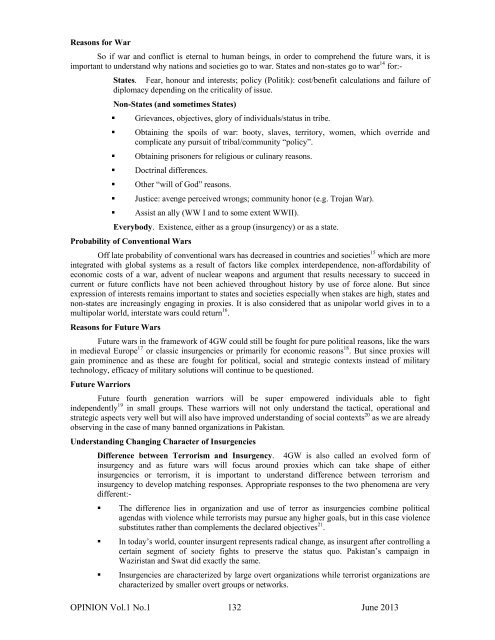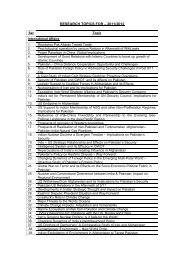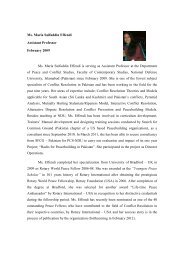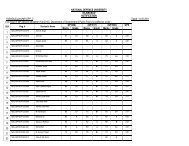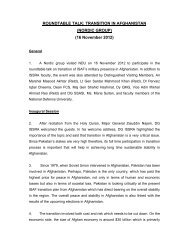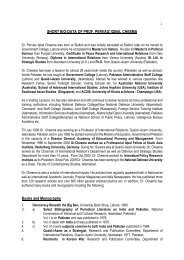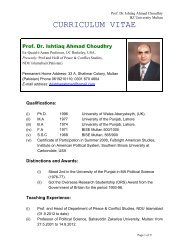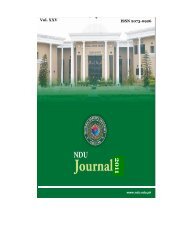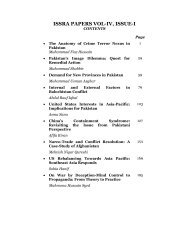OPINION Vol.1, No.1 June 2013 - National Defence University
OPINION Vol.1, No.1 June 2013 - National Defence University
OPINION Vol.1, No.1 June 2013 - National Defence University
You also want an ePaper? Increase the reach of your titles
YUMPU automatically turns print PDFs into web optimized ePapers that Google loves.
Reasons for War<br />
So if war and conflict is eternal to human beings, in order to comprehend the future wars, it is<br />
important to understand why nations and societies go to war. States and non-states go to war 14 for:-<br />
States. Fear, honour and interests; policy (Politik): cost/benefit calculations and failure of<br />
diplomacy depending on the criticality of issue.<br />
Non-States (and sometimes States)<br />
• Grievances, objectives, glory of individuals/status in tribe.<br />
• Obtaining the spoils of war: booty, slaves, territory, women, which override and<br />
complicate any pursuit of tribal/community “policy”.<br />
• Obtaining prisoners for religious or culinary reasons.<br />
• Doctrinal differences.<br />
• Other “will of God” reasons.<br />
• Justice: avenge perceived wrongs; community honor (e.g. Trojan War).<br />
• Assist an ally (WW I and to some extent WWII).<br />
Everybody. Existence, either as a group (insurgency) or as a state.<br />
Probability of Conventional Wars<br />
Off late probability of conventional wars has decreased in countries and societies 15 which are more<br />
integrated with global systems as a result of factors like complex interdependence, non-affordability of<br />
economic costs of a war, advent of nuclear weapons and argument that results necessary to succeed in<br />
current or future conflicts have not been achieved throughout history by use of force alone. But since<br />
expression of interests remains important to states and societies especially when stakes are high, states and<br />
non-states are increasingly engaging in proxies. It is also considered that as unipolar world gives in to a<br />
multipolar world, interstate wars could return 16 .<br />
Reasons for Future Wars<br />
Future wars in the framework of 4GW could still be fought for pure political reasons, like the wars<br />
in medieval Europe 17 or classic insurgencies or primarily for economic reasons 18 . But since proxies will<br />
gain prominence and as these are fought for political, social and strategic contexts instead of military<br />
technology, efficacy of military solutions will continue to be questioned.<br />
Future Warriors<br />
Future fourth generation warriors will be super empowered individuals able to fight<br />
independently 19 in small groups. These warriors will not only understand the tactical, operational and<br />
strategic aspects very well but will also have improved understanding of social contexts 20 as we are already<br />
observing in the case of many banned organizations in Pakistan.<br />
Understanding Changing Character of Insurgencies<br />
Difference between Terrorism and Insurgency. 4GW is also called an evolved form of<br />
insurgency and as future wars will focus around proxies which can take shape of either<br />
insurgencies or terrorism, it is important to understand difference between terrorism and<br />
insurgency to develop matching responses. Appropriate responses to the two phenomena are very<br />
different:-<br />
• The difference lies in organization and use of terror as insurgencies combine political<br />
agendas with violence while terrorists may pursue any higher goals, but in this case violence<br />
substitutes rather than complements the declared objectives 21 .<br />
• In today’s world, counter insurgent represents radical change, as insurgent after controlling a<br />
certain segment of society fights to preserve the status quo. Pakistan’s campaign in<br />
Waziristan and Swat did exactly the same.<br />
• Insurgencies are characterized by large overt organizations while terrorist organizations are<br />
characterized by smaller overt groups or networks.<br />
<strong>OPINION</strong> <strong>Vol.1</strong> <strong>No.1</strong> 132 <strong>June</strong> <strong>2013</strong>


